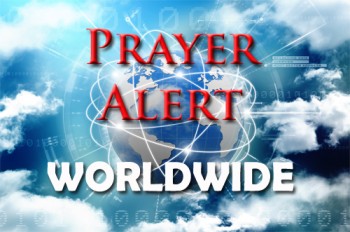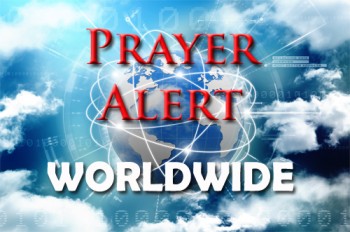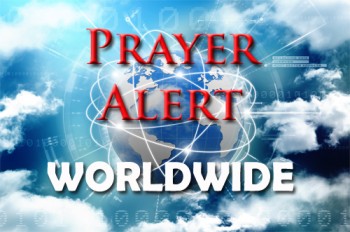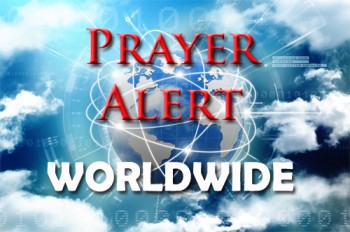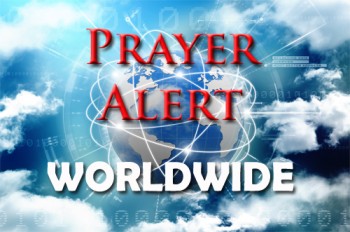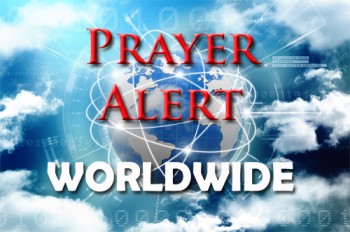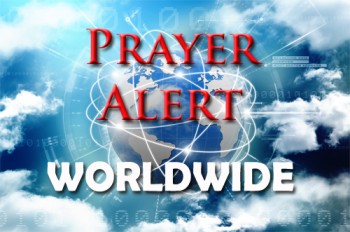Displaying items by tag: Asia
China: keep praying
A baby born in Wuhan was diagnosed with coronavirus thirty hours after birth. It is unclear if the disease was transmitted in the womb or after birth. Medical experts believe the infection could have been contracted in the womb. Pray for God to place a blanket of security and peace over the families and relatives of the infected who are currently living in isolation and fear. In China alone, there are 25,000+ confirmed cases, and currently 570+ dead with both numbers rising rapidly. The World Health Organisation says that there is a ‘window of opportunity’ to stop it becoming a global pandemic crisis. Pray for God to strengthen health workers and research scientists to do all that is necessary. May poorer countries’ leaders have the wisdom and funding to halt coronavirus spreading. May the love of Jesus spread more quickly and further than the virus, through active churches reaching every corner with His eternal hope. See
China: coronavirus - wildlife trade - ecology
China's demand for wildlife products for traditional medicine and exotic foods is driving a global trade in endangered species. Markets selling live animals are considered a potential source of diseases that are new to humans. Over 70% of emerging human infections are estimated to have come from animals, particularly wild animals. Campaigners want China to apply a permanent ban on the wildlife trade. Pray that their crusade is successful and this trade becomes illegal. Editorials in China's state-controlled media have denounced the uncontrolled wildlife market. Ecologists say the coronavirus outbreak could provide China with an opportunity to prove that it is serious about protecting biodiversity. In September this year, Beijing will be hosting a major global meeting on natural and biological resources, known as the Convention on Biological Diversity. A report last year by an intergovernmental group found that one million species are at risk of extinction.
Iraq: protests swell
When their tents were burned, Iraqi protesters replaced them with concrete structures. When influential cleric Muqtada al-Sadr withdrew his support, even more protesters turned out despite fears of a crackdown by security forces. On 1 February al-Sadr ordered his followers back to Tahrir Square, where they clashed with demonstrators and forcibly took over the main part of the square. The nomination of Mohammed Tawfiq Allawi as the new prime minister has been received negatively by the protesters, who see his choice as a plot by al-Sadr and his Iran-backed allies to end the protests in Baghdad. The parliament needs to hold a session to vote on the nomination. The Sadrist group is now cooperating with the security forces to end the sit-in at the square.
China: coronavirus update
Please continue to pray for the success of thermal-imaging screening and other airport precautions to contain coronavirus. Over 130 people have died, and the total is rising daily; there are 6,000 confirmed cases, but due to under-reporting the true figure may well be much higher. Pray for those who have unwittingly been in contact with the virus to be discovered by investigating authorities, as only detective searches can bring this epidemic to an end. Currently there is no vaccine for the virus; may God help scientists make an antidote. Pray for His peace to surround the many frustrated people who are subject to limits on travel at home and abroad. Pray for the success of the information programme encouraging hand-washing. Praise God for a 1,000-bed coronavirus hospital , completed after 48 hours of construction, and for an even more ambitious hospital building project due to be completed by Monday. Pray for an equally speedy delivery of protective clothing for healthcare workers. See also
China: Africans trapped in lockdown
With rich countries like the US evacuating their students, Doctor Bakari, a Tanzanian PhD student, has become a leader for hundreds of students from poorer African countries stranded in Wuhan with little chance of escape. Beijing’s expanding influence on the youthful African continent means Africans are the second-largest population of foreign students. Over 4,000 are estimated to be in Wuhan alone. No one knows how long the lockdown will last, or all the ways the virus can spread. Students fear that angering Chinese or their country’s authorities could lead to retribution such as withdrawing scholarships. Kenya’s government had to defend itself against accusations that it was not helping its students. ‘Students don’t have a clue what’s going on’, says Bakari, who is sending updates on social media to 400+ Tanzanian students in Wuhan and hundreds more across China. ‘Together we are one family,’ his association tweeted, encouraging fellow Africans to take precautionary measures.
Israel: peace plan protests
Palestinian terror groups Hamas and Islamic Jihad have rejected Donald Trump’s peace plan which was unveiled on 28 January. Many Palestinians protested in the West Bank, and the US embassy warned of potential terror attacks. The plan calls for a two-state solution with detailed maps of territory showing territory currently under Palestinian control more than doubled, while recognising Israeli sovereignty over major West Bank settlement blocs. Palestine’s president, Mahmoud Abbas, had a rare phone call with Hamas head Ismail Haniyeh in which they agreed to work together against the plan, even though Abbas’s Fatah faction has been at loggerheads with Hamas for over a decade. Palestinian demonstrators at the entrance to Ramallah City burnt tyres, chanting, ‘We will resist the occupier and we announce our rejection of the deal of the century. We won’t accept any substitute for Jerusalem as the capital of the Palestinian state.’ Trump’s plan enshrines Jerusalem as Israel’s ‘undivided’ capital.
He was the answer to his own prayers
Philip saw members of his isolated tribal community in Bangladesh dying from simple diseases (malaria, diarrhoea, childbirth complications) because there was no medical care. ‘I asked God to open a door for our community because I could do nothing. I never thought that God would open the door through me!’ With help from Open Doors, Philip trained as a rural doctor and returned to his village to serve as a pastor and a doctor, providing medical help and supporting Christian families who were mocked and insulted in a traditionally Buddhist tribal community. ‘But now they have started respecting the Christians. They buy medicine from me and say good things about my service. I am building good relationships with them and telling them about Jesus Christ.’
China: coronavirus Wuhan lockdown
A virus that was first discovered on 31 December in Wuhan now has over 500 confirmed cases and has spread abroad. Anxiety is growing as 11 million people are told not to leave the city and experience lockdown in an attempt to control the spread which is killing people (17 dead, with the toll rapidly rising). Planes and trains in and out of the city are suspended, and no buses, subways, taxis or ferries are running. Millions of Chinese people travel to different destinations for the 25 January lunar New Year holiday. Supermarket shelves were reportedly bare as residents scrambled for supplies, while people took to social media to complain about soaring prices for groceries. The virus, which originated in a seafood market ‘conducting illegal transactions of wild animals’, may have originated in snakes. The centre for infectious disease analysis at Imperial College London estimates that there could be 4,000 people sick with the virus in Wuhan.
Israeli elections: prayers for the next government
All the lists of candidates parties have now been submitted, and some parties have agreed to run together in this new election. There was a joining together of several left wing and some of the smaller right wing parties, yet polls show that there will be no clear victor. We cry out for mercy: ‘Lord, have mercy on Your people as Israel needs a God-given government. Since You are the One who raises up and pulls down, please raise up the one of Your choice to be the next prime minister, defence minister, finance minister, etc. We plead with You for a government which will do Your will for Israel at this time. Abba, show us how to pray and even give us specific people to pray for. President Trump plans a “Deal of the Century” peace plan that could impact the elections. May you reign over the timing and content of this plan.’ (Psalm 99:1)
Saudi Arabia / Yemen: prayer focus
The Lord has moved the hearts of workers in Saudi Arabia and Yemen to have a special prayer focus for the Khawlan people, a tribe with a unique Semitic language living in a region straddling the border between Yemen and Saudi Arabia. During a special prayer gathering in Saudi Arabia for the Khawlan Tribe in October, those present sensed that God was encouraging a call for the global church to join in a five day prayer focus for these unreached people. Would you join in? People can pray at any time, and there will be a special prayer focus for this people group from 14 to 18 February. Click the ‘More’ button for a five-day prayer guide translated into various languages, including English, plus a video.
